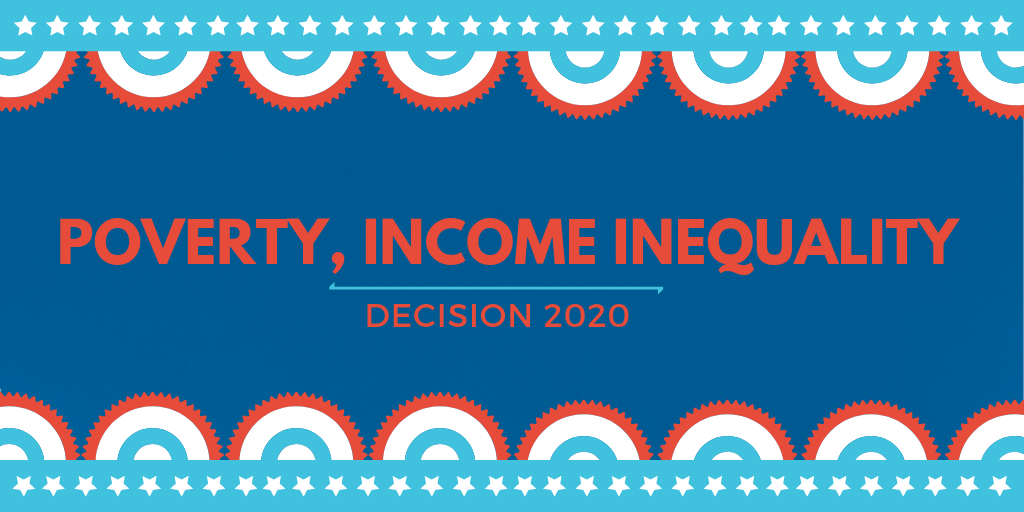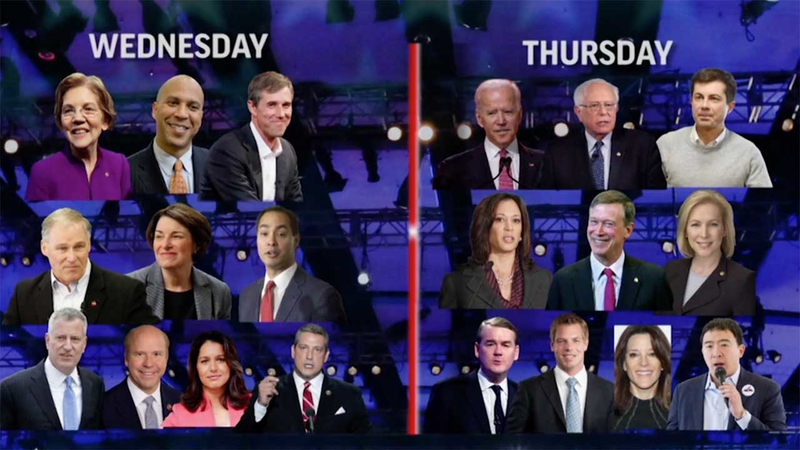
The Miami debates: Did the presidential candidates discuss poverty?

Last month, Voices for Human Needs wrote about an event sponsored by the Poor People’s Campaign: A National Call for Moral Revival. The event featured nine presidential candidates who took turns taking the stage at Trinity Washington University to discuss their plans for fighting poverty in the United States.
At the time of the event, it was noted that when presidential candidates gather for traditional debates, poverty does not exactly take center stage. In the chaotic 2016 election, for example, not one of the 26 presidential debates centered exclusively around poverty. And in 2012, if you watched the four general election debates between President Obama and challenger Mitt Romney, you did not hear a single question about the state of poverty in our country.
So we wondered what would happen when 20 candidates gathered for two debates last week in Miami; would poverty and economic injustice be a focus of attention?
The 20 candidates were split into two groups, with ten participating in a two-hour debate on Wednesday, June 26, and the other ten following up with another two-hour event the following evening. Voices for Human Needs both watched the debates closely and then analyzed transcripts of the two events published by the Washington Post. What we found was not perfection, but certainly progress.
Examining the transcripts, we discovered that words and phrases like “poverty,” “poor,” “low-income,” and “income inequality” were used at least 15 times by the candidates and moderators of the debates. Often they were used quite interchangeably. And, in case anyone hasn’t noticed, a fundamental shift is underway in the way we discuss poor people and poverty – the phrase “income inequality” is emerging as a popular catch-all to describe these issues.
This is certainly progress. Rev. Dr. William Barber II, co-chair of the Poor People’s Campaign, credits activism for the shift in emphasis. In remarks he made in the run-up to the campaign’s presidential candidate event last month, he said, “Republicans talk about the economy, while Democrats speak of the middle class. Nobody talks about the poor. The Poor People’s Campaign is organizing across lines created to divide us and we’re forcing those in power to listen.”
So what happened at the debates? The words “poor” and “income inequality” surfaced fairly early in the first debate in Miami, when NBC anchor and debate moderator Jose Diaz-Balart served up New York City Mayor Bill De Blasio’s first question:
“Mayor De Blasio, good evening. You’re the mayor of the biggest city in the United States, but it’s also one of the cities in the country with the greatest gap between the wealthy and the poor. How would you address income inequality?”
De Blasio’s response began, “Well, we’re been addressing income inequality in New York City by raising wages, by raising benefits, by putting money back in the hands of working people, $15 minimum wage, paid sick days, pre-K for all, things that are making a huge difference in working people’s lives.”
Some of the candidates on the stage, like De Blasio, used their personal experiences to talk about poverty and income inequality. Sen. Cory Booker (D-NJ), for example, mentioned several times that he lives in a low-income community of color. “I see every single day that this economy is not working for average Americans,” he said. “The indicators that are being used, from GDP to Wall Street’s rankings, is not helping people in my community. It’s about time that we have an economy that works for everybody, not just the wealthiest in our nation.”
Sen. Michael Bennet (D-CO), who saw poverty up close when he served as superintendent of Denver’s public schools, noted that “we’ve got the worst income inequality that we’ve had in 100 years.”
Three candidates – Bennet, De Blasio, and Sen. Bernie Sanders (I-VT) – mentioned poverty in their closing statements, even though they were not prompted to do so. (Former Vice President Joe Biden, in his closing statement, cited “the poor and hard-working middle class people.”)
Some candidates mentioned income inequality as part of a larger context. For example, Sen. Kirsten Gillibrand (D-NY) discussed her plan to fight political corruption. “If we do that and get money out of politics, we can guarantee health care as a right, not a privilege, we can deal with institutional racism, we can take on income inequality, and we can take on the corporate corruption that runs Washington.”

To be sure, only a couple of minutes out of four hours of debate focused exclusively on poverty, on poor people, on income inequality. But that characterization is a tad bit unfair. For example, candidates spent considerable time discussing access to health care, access to college. Those are issues very directly connected to poverty – and they are certainly part of the answer in addressing poverty. Sen. Elizabeth Warren (D-MA) was a good example of this. She never used the words “income inequality” or “poor” or “poverty.” But much of her message on the economy, on health care, on education, appeared to be an effort to address such issues.
So. In Miami, progress, not perfection. What are we to do going forward? Well, it’s important to pay close attention to the candidates and what they have to say about poverty, poor people, and income inequality. For those of us lucky enough to have the opportunity, it’s important to press the campaigns, one on one, on these issues.
A national conversation about poverty won’t happen on its own. As Rev. Barber II might say, we have to force it to happen.

